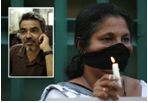Sri Lanka is now before the United Nations Human Rights Council at a time when the Council is to discuss in what ways Sri Lanka can improve the human rights situation of its people.
The overall mind set with which the government is approaching the Council can be summed up with the phrase, “Catch us if you can”. This is said quite dramatically and the government’s representatives want to convince the UN Council that it will never succeed in any endeavor to help Sri Lanka improve the treatment of its own people.
How we treat our people is our own concern, is what the government is saying to the international bodies. That is, in fact, what sovereignty means says the government. Whatever stinks within our boundaries is our own affair, is the way the political concept of sovereignty is interpreted.
If any Sri Lankan says or does anything in support of the United Nations effort to do what it can to make things better and happier for the people such a person is labeled a traitor. To be a good citizen is to say that he or she has never seen or heard any ill that the government has done. That may be hypocritical but a good citizen in the present circumstances should learn to be a hypocrite. Hypocrisy is not a vice in the holy land of Sri Lanka but rather a great virtue. No one that possesses that virtue could be a patriot.
It is not only about what happens at the Human Rights Council. It is also the case within the country itself. Let us take a few examples: The removal of the Chief Justice of Sri Lanka without a credible inquiry by a neutral body may be regarded as a serious vice elsewhere but in Sri Lanka that is not so. The appointment of a chief justice whose credentials were questioned before clearing him of the accusation which gave rise to such criticism may be considered a grave vice elsewhere. That is not so in Sri Lanka.
For a government to claim that it has been unable to make a successful inquiry into very serious crimes, which have also been treated as scandals as the government’s own involvement in such crimes are feared, may be a vice elsewhere, however, that is not so in Sri Lanka. It is considered to be quite clever of the government to prevent credible investigations into serious crimes.
The people, from time to time, are found after arrest, or allegedly in the attempt to arrest to have been subjected to summary executions. For example, the recent case of two alleged suspects in the murder of the chief monk at Moratuwa. They were both found to have been killed execution style; shot in the back of the head. This may be considered a serious crime elsewhere but in Sri Lanka this is considered a heroic task which will teach a good lesson for other criminals. Similarly, just this week two persons were found dead after an alleged incident of a car robbery and it was claimed that they were killed in a shootout. Elsewhere such a claim by the police would be subjected to a thorough inquiry but not so in Sri Lanka.
 Just to take another case, the case of Pattani Razeek. At first it was said that he had disappeared. Months thereafter, his body was found under the foundations of a house. The name of the owner of the property is known and also all other details. However, after three years there is only a ‘B’ report in the courts about the case. Elsewhere such conduct would be condemned as the gross cover-up of a crime. However, in Sri Lanka it is seen as a very clever way disclaiming responsibility.
Just to take another case, the case of Pattani Razeek. At first it was said that he had disappeared. Months thereafter, his body was found under the foundations of a house. The name of the owner of the property is known and also all other details. However, after three years there is only a ‘B’ report in the courts about the case. Elsewhere such conduct would be condemned as the gross cover-up of a crime. However, in Sri Lanka it is seen as a very clever way disclaiming responsibility.
 Finally let us take the case of Prageeth Eknaligoda. It has been claimed that he disappeared. That government propaganda machinery thinks it clever to claim that he has sought asylum in some country and that he is still alive. His wife’s constant pressing for a proper enquiry is treated with cynical contempt by the government.
Finally let us take the case of Prageeth Eknaligoda. It has been claimed that he disappeared. That government propaganda machinery thinks it clever to claim that he has sought asylum in some country and that he is still alive. His wife’s constant pressing for a proper enquiry is treated with cynical contempt by the government.
Human Rights Watch has published a report of 75 case narratives where women claim to have been sexually abused by the security forces. Elsewhere a government would have taken serious note of such a report and caused a serious investigation into the allegations. In Sri Lanka the government spokesman stated that these are just fabrications and that it the government’s interest in the matter.
Naturally such a list of items has to be kept brief as a detailed narrative would mean literally hundreds of pages.
The short lesson is that in Sri Lanka what any civilised nation would consider as a vice is treated as a virtue. Anyone who seeks justice is told “catch us if you can”. Playing hide and seek is considered a game that the government is a master at and the people are supposed to applaud its success.